Chances are that if I ask you to picture a caregiver you’ll picture a woman. That’s not surprising – according to Michigan State University, 66% of caregivers are women. In previous blogs I’ve often highlighted the disproportionate impact of caregiving on women; and as we emerge from COVID, that has been exacerbated by childcare difficulties as discussed in my recent Washington Post OpEd.
As we approach Father’s Day, though, I want to take the opportunity to highlight some unsung heroes – male caregivers. Among the thousands of friends and neighbors who benefit from Easterseals programs every year are men like Michael Smith, who have become caregivers themselves. I’m also proud of the diverse team at Easterseals that includes many men in caregiving roles and honored to highlight three today. Marcus Bolston, Larry Johnson, and Dr. Shea Lott are wonderful examples of our commitment to creating a hopeful, inclusive community where all people realize their potential and live meaningful lives. They embody our Core Values of Respect, Responsibility, Integrity, Innovation, and Care – listening to our participants’ needs then adapting programs to realize the participant’s goals.
Marcus Bolston: Director, Morris & Gwendolyn Cafritz Adult Day Services

Marcus Bolston takes pride in connecting with people from all backgrounds, “Anytime you get to work closely with families and the individuals you serve, you build a great connection that lasts for a long time.” In his role as Adult Day Services Director, Marcus enjoys creating a socially enriched environment, connecting with patients, and also ensuring high quality care for participants with a wide range of diagnoses, including Alzheimer’s disease, Dementia, and Down syndrome. For Marcus, respect means taking every opportunity to learn from those around him. For example, Marcus recently drove a patient with no transportation to get his vaccine in Baltimore, and, “When he came back he shared how much he learned about the individual and the good conversation they had,” notes Marcus’ supervisor, Liz Barnes.
For Marcus, connecting with those around him is natural. His favorite memories from his years with Easterseals are the times with his staff and participants during holiday parties or events. He hosts regular holiday-themed parties for Christmas, Cinco de Mayo, New Years and the occasional cookout, “Most importantly I get to meet people from all walks of life, hear their stories, and learn from them which is both inspiring and humbling.”
Larry D. Johnson, Jr.: Director, Easterseals Harry & Jeanette Weinberg Child Development Center

Larry’s supervisor, Tara Phillips, speaks highly of his aesthetic eye and keen ability to prepare classroom environments that are inviting and comforting to children based on their needs. However, the memory of Larry that resonates strongest for her exemplifies his true character, “Soon after Larry was hired, he recognized the landscaping at the Child Development Center needed an upgrade.” He wanted the center to look warm and welcoming for children and their families, so he took that upon himself. “One Saturday morning,” Tara continued, “Larry came to the center with his personal lawn mower and lawn bags and he cut the grass and trimmed the hedges. He was sweating, but noticeably intent on cleaning up the last debris that were on the sidewalk.”
If you ask Larry, he’ll tell you there’s no better feeling than having a conversation with a child and listening to his or her innocent take on the world. His time with children brings him joy every day, but his role as a leader is not lost, “It is extremely rewarding to have team members further their education because I’ve inspired them. To know that I have had that kind of influence on someone feels good.”
Dr. Shea Lott: Lead Clinician, Clinical Psychologist The Steven A. Cohen Military Family Clinic at Easterseals

When he joined the Easterseals team in October, Dr. Shea Lott set out to ensure that veterans, active duty servicemembers, and their families have access to the highest quality care so they can fully participate in our community. As Lead Clinician and Director for Clinical Training at the Steven A. Cohen Military Family Clinic, Shea wears many hats and juggles many administrative priorities – but if you ask him, none are more important than helping veterans and their families, “When treatment has concluded and the clients say the services changed their life or the life of their family member for the better – that’s a priceless and timeless experience.”
At Easterseals, Shea takes pride in using evidence-based care to ensure his clients heal. He recently treated a client with PTSD caused by observing and experiencing discrimination in the wake of the DC protests, riots, and insurrection. “Working with this individual and leveraging prolonged exposure therapy has been a game changer for the client, whose symptoms of PTSD are now in remission,” says Shea. “This is a great example of therapy leading to improved interpersonal interactions and self-concept development so that the individual can participate fully in our vibrant community.”
For Marcus, Larry, and Shea, their profession is so much more than a paycheck. It’s an opportunity to heal, serve, and learn; and we are a better organization for having men of their character on our team. To Marcus, Larry, Shea and the rest of our team, I appreciate your unwavering commitment and dedication.












 A large part of Easterseals’ success in achieving our mission – making profound, positive differences in the daily lives of people of all ages with disabilities, special needs, military backgrounds, and their families – is the collaborations we have with other like-minded organizations.
A large part of Easterseals’ success in achieving our mission – making profound, positive differences in the daily lives of people of all ages with disabilities, special needs, military backgrounds, and their families – is the collaborations we have with other like-minded organizations.
 healing their relationships and families, discovering new ways to express themselves in a positive way, creating bonds working with our dogs and feeling a sense of accomplishment by seeing these dogs placed in a forever home. Through our partnership with the Cohen Clinic, we believe we can reach a greater veteran population of those desiring to continue the mission, seeking purpose since leaving the military, as well as participating in volunteer work that thrives on fulfilling the Warrior Ethos.”
healing their relationships and families, discovering new ways to express themselves in a positive way, creating bonds working with our dogs and feeling a sense of accomplishment by seeing these dogs placed in a forever home. Through our partnership with the Cohen Clinic, we believe we can reach a greater veteran population of those desiring to continue the mission, seeking purpose since leaving the military, as well as participating in volunteer work that thrives on fulfilling the Warrior Ethos.”

 “I am interested in training service dogs because I know it worked for me. My dog was given to me as a therapy dog and she’s been my lifesaver. She helps me with a lot of my issues and I just see this as a great way to give back,” said Derrick, U.S. Army veteran.
“I am interested in training service dogs because I know it worked for me. My dog was given to me as a therapy dog and she’s been my lifesaver. She helps me with a lot of my issues and I just see this as a great way to give back,” said Derrick, U.S. Army veteran.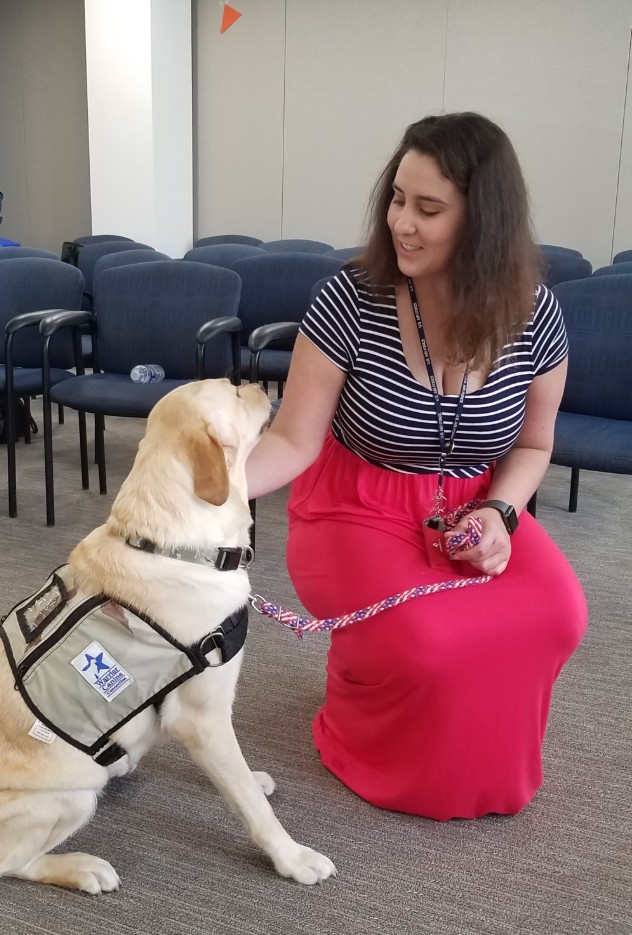 “This partnership is a win-win for both The Steven A. Cohen Military Family Clinic at Easterseals and the Warrior Canine Connection because it allows both organizations to help our wounded warriors find the best way to bring joy back into their lives. For the Cohen Clinic, helping veterans get better is more than just managing the mental health aspect of it. It is also about helping veterans find wellness, which is just as important,” said Mallary Lass, USAF Ret., Outreach Manager with the Cohen Clinic.
“This partnership is a win-win for both The Steven A. Cohen Military Family Clinic at Easterseals and the Warrior Canine Connection because it allows both organizations to help our wounded warriors find the best way to bring joy back into their lives. For the Cohen Clinic, helping veterans get better is more than just managing the mental health aspect of it. It is also about helping veterans find wellness, which is just as important,” said Mallary Lass, USAF Ret., Outreach Manager with the Cohen Clinic.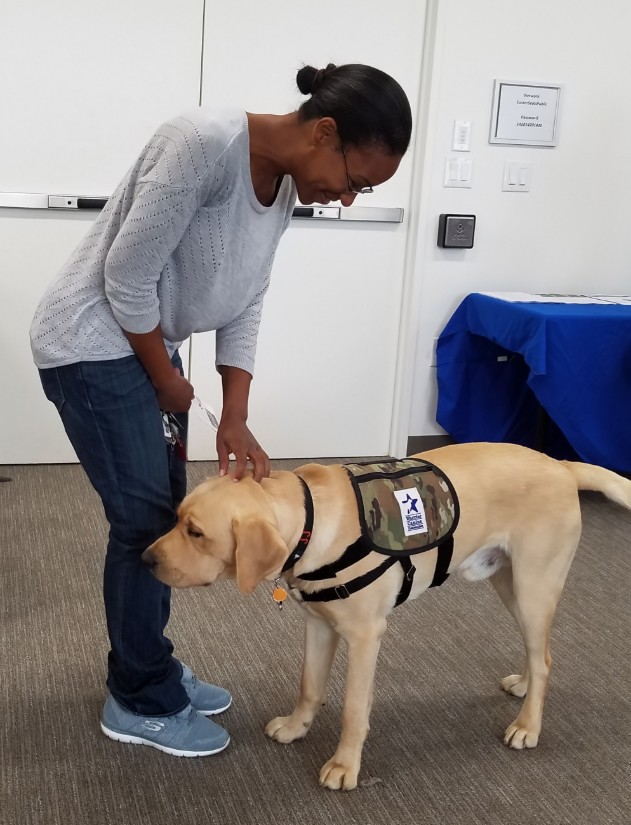 “I’ve been trying to involve myself in more stuff. So when the Cohen Clinic sent me the information, I thought it would be a good chance to work on socializing myself after I came back with my trauma. With this program, I also like that I can be flexible with my commitment and maybe participate once a week. Plus, I like the idea of giving back to the veteran community,” said Natalie, U.S. Army veteran.
“I’ve been trying to involve myself in more stuff. So when the Cohen Clinic sent me the information, I thought it would be a good chance to work on socializing myself after I came back with my trauma. With this program, I also like that I can be flexible with my commitment and maybe participate once a week. Plus, I like the idea of giving back to the veteran community,” said Natalie, U.S. Army veteran.
 To help provide more insight to veterans living with PTSD, we spoke with Anneke Vandenbroek, Ph.D., ABPP – a licensed clinical psychologist and the lead clinician at the Steven A. Cohen Military Family Clinic at Easterseals – who has been working with military service members for over 20 years in the treatment of PTSD, depression, anxiety disorders and other behavioral health disorders. She shares with us HOW the Cohen Clinic is helping veterans break down barriers to get the support they need for PTSD.
To help provide more insight to veterans living with PTSD, we spoke with Anneke Vandenbroek, Ph.D., ABPP – a licensed clinical psychologist and the lead clinician at the Steven A. Cohen Military Family Clinic at Easterseals – who has been working with military service members for over 20 years in the treatment of PTSD, depression, anxiety disorders and other behavioral health disorders. She shares with us HOW the Cohen Clinic is helping veterans break down barriers to get the support they need for PTSD.

 We also offer telehealth services, which is one of the BIGGEST things we can do to overcome barriers to treatment because people can access care from their living room, office or even a parked car. They don’t have to take time to travel to the clinic. It really only takes 50 minutes out of their day to attend the appointment, so they don’t need to use leave time, travel time, get stuck in Beltway traffic to get here. It’s really fantastic.
We also offer telehealth services, which is one of the BIGGEST things we can do to overcome barriers to treatment because people can access care from their living room, office or even a parked car. They don’t have to take time to travel to the clinic. It really only takes 50 minutes out of their day to attend the appointment, so they don’t need to use leave time, travel time, get stuck in Beltway traffic to get here. It’s really fantastic. What he did know was that it was WRONG to hide children who were “crippled” or different in hospital wards. He knew that each of these individuals could contribute to society and make it better. That they deserved to be included. So he created Easterseals. It could have failed – the public that feared individuals with disabilities could have shunned him.
What he did know was that it was WRONG to hide children who were “crippled” or different in hospital wards. He knew that each of these individuals could contribute to society and make it better. That they deserved to be included. So he created Easterseals. It could have failed – the public that feared individuals with disabilities could have shunned him.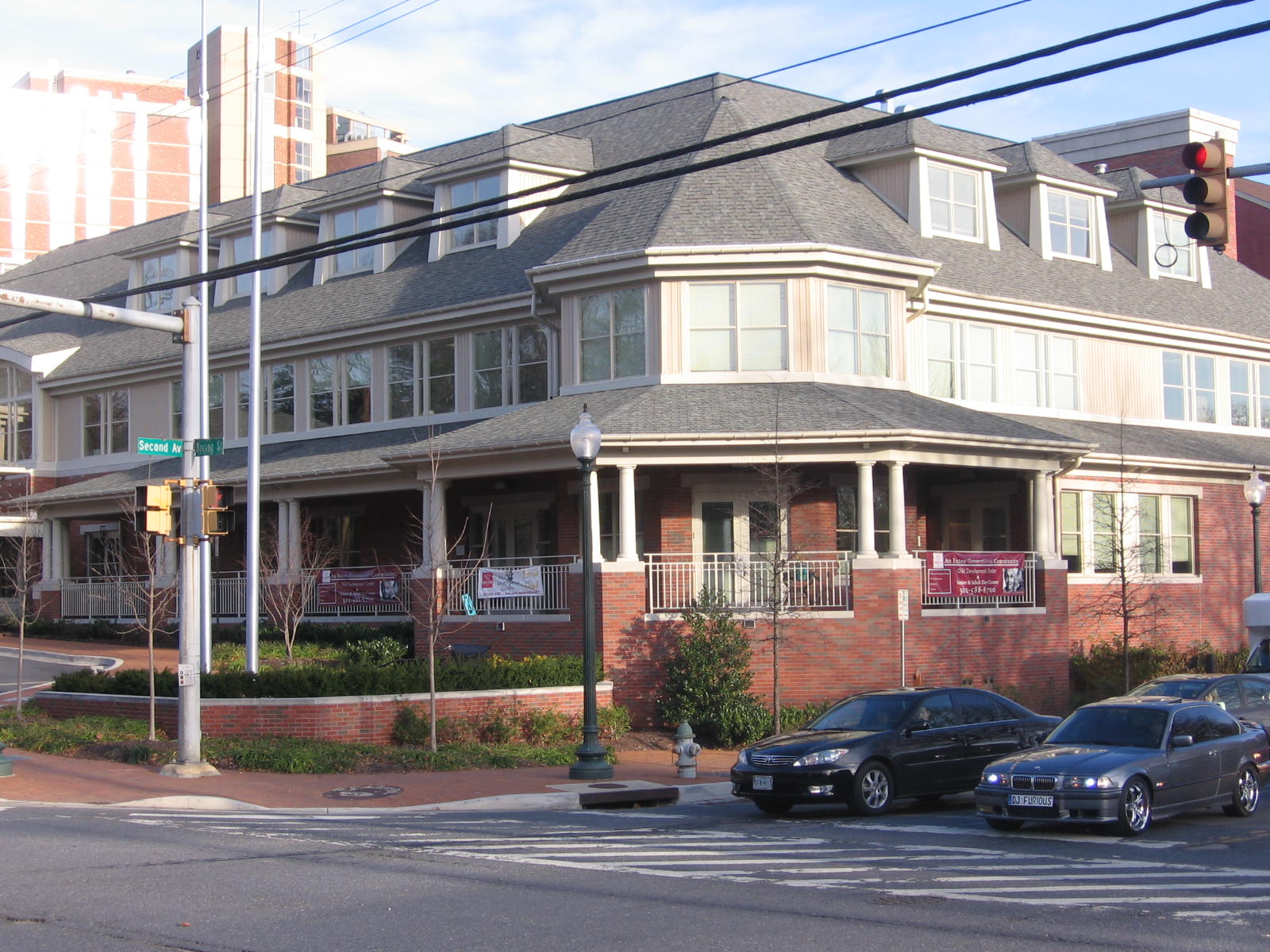 Today, we are one of 71 affiliates across the country providing life-changing services to people of all ages with disabilities, special needs, military backgrounds, and their families in our communities.
Today, we are one of 71 affiliates across the country providing life-changing services to people of all ages with disabilities, special needs, military backgrounds, and their families in our communities. We also believe that a critical time for us to learn the importance of inclusion starts at a young age when children are taught social norms. For us, teaching children with and without disabilities in an inclusive classroom setting provides invaluable learning, healthy socialization and growth for all children.
We also believe that a critical time for us to learn the importance of inclusion starts at a young age when children are taught social norms. For us, teaching children with and without disabilities in an inclusive classroom setting provides invaluable learning, healthy socialization and growth for all children.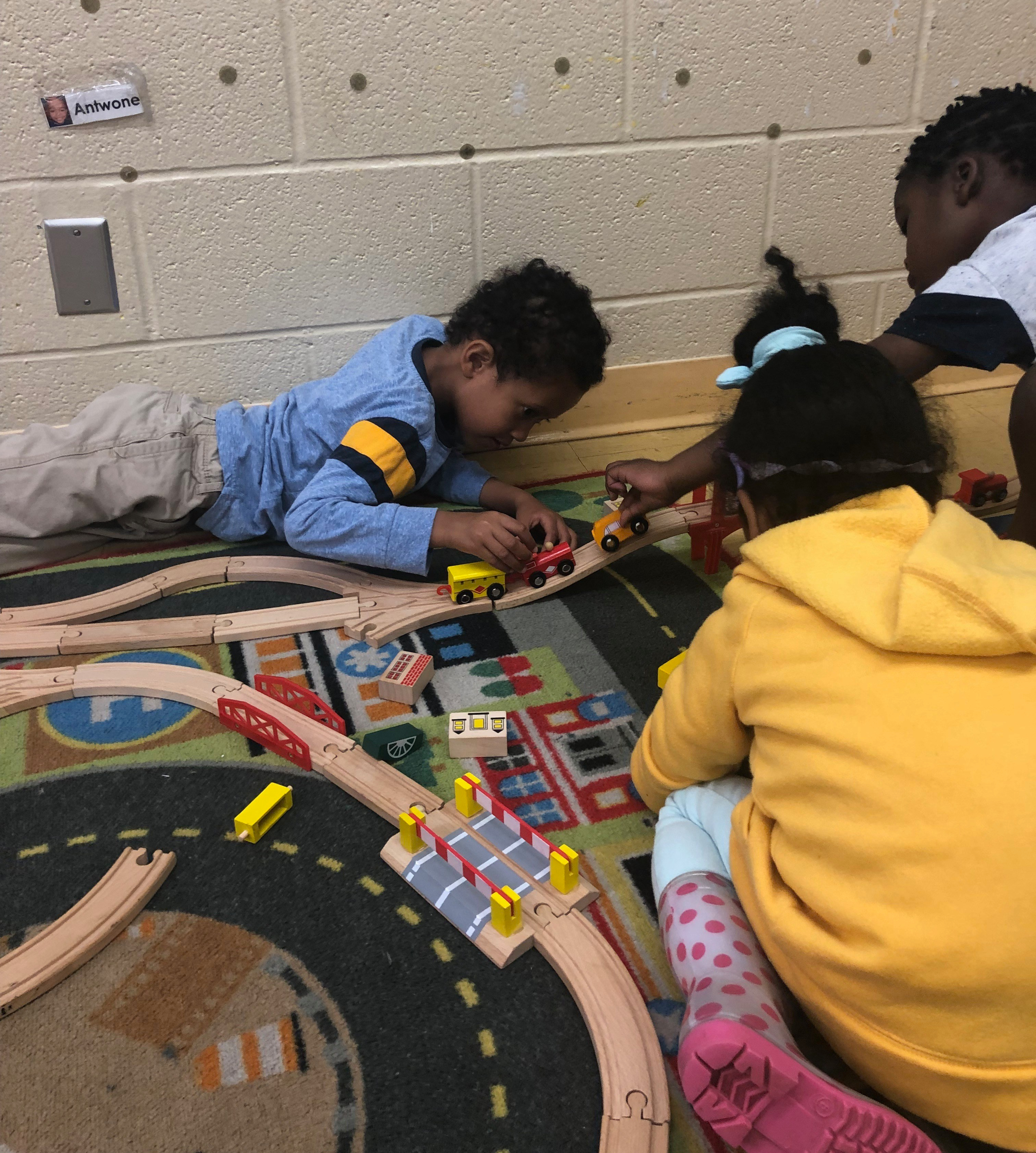 This came about because the parent had a recent meeting with the public schools to review their recommendations when the child graduates from Easterseals at the end of the summer. When her son (who has Autism) was initially evaluated 2 years ago by the school system, they recommended that he be placed in a self-contained (all special education) classroom with 4 hours of speech therapy a month. The schools indicated that Beck’s “adaptive, cognitive, social and communication skills were delayed to the extent that they recommended a small classroom size with a small student-to-teacher ratio and an adapted or modified curriculum.
This came about because the parent had a recent meeting with the public schools to review their recommendations when the child graduates from Easterseals at the end of the summer. When her son (who has Autism) was initially evaluated 2 years ago by the school system, they recommended that he be placed in a self-contained (all special education) classroom with 4 hours of speech therapy a month. The schools indicated that Beck’s “adaptive, cognitive, social and communication skills were delayed to the extent that they recommended a small classroom size with a small student-to-teacher ratio and an adapted or modified curriculum. We want to provide a more comprehensive solution to employers and increase the percentage of people with disabilities finding meaningful employment. Since we launched more than a year ago, we are proud of the fact that we have helped coached more than 320 people and placed over 100 talented individuals living with disabilities in jobs they can be proud of.
We want to provide a more comprehensive solution to employers and increase the percentage of people with disabilities finding meaningful employment. Since we launched more than a year ago, we are proud of the fact that we have helped coached more than 320 people and placed over 100 talented individuals living with disabilities in jobs they can be proud of. Recent examples that come to mind include our registered nurse in the Silver Spring Adult Day Center who came up with new ideas for enhancing our meetings between staff, participants and caregivers so that everybody is fully engaged and is able to give critical feedback.
Recent examples that come to mind include our registered nurse in the Silver Spring Adult Day Center who came up with new ideas for enhancing our meetings between staff, participants and caregivers so that everybody is fully engaged and is able to give critical feedback. Advocacy Awards Chair Tom Portman and Easterseals Board Chair Robin Portman kicked off the event with a welcome of more than 500 guests and then introduced a powerful video of mother Angela Spraul, who shared how Easterseals supported her family after the passing of her husband, a veteran of the U.S. Navy.
Advocacy Awards Chair Tom Portman and Easterseals Board Chair Robin Portman kicked off the event with a welcome of more than 500 guests and then introduced a powerful video of mother Angela Spraul, who shared how Easterseals supported her family after the passing of her husband, a veteran of the U.S. Navy.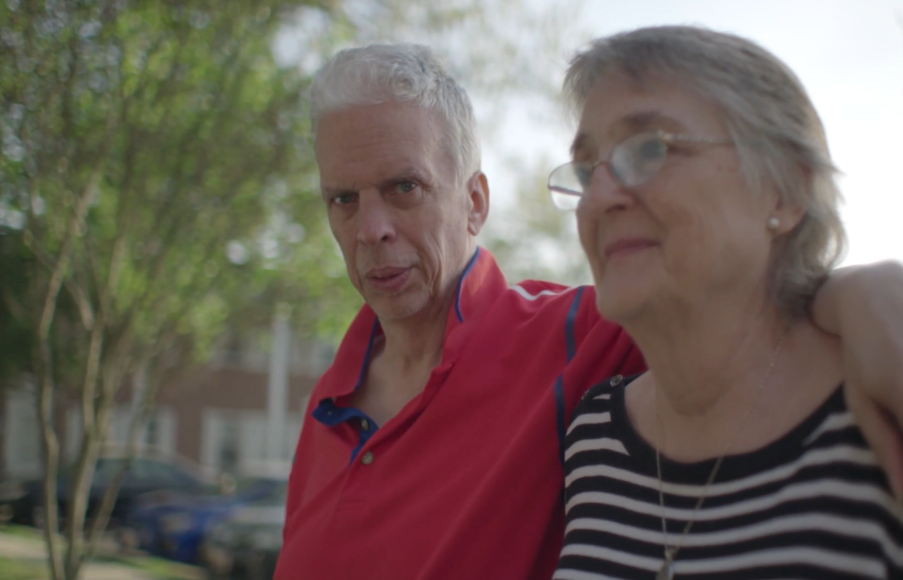









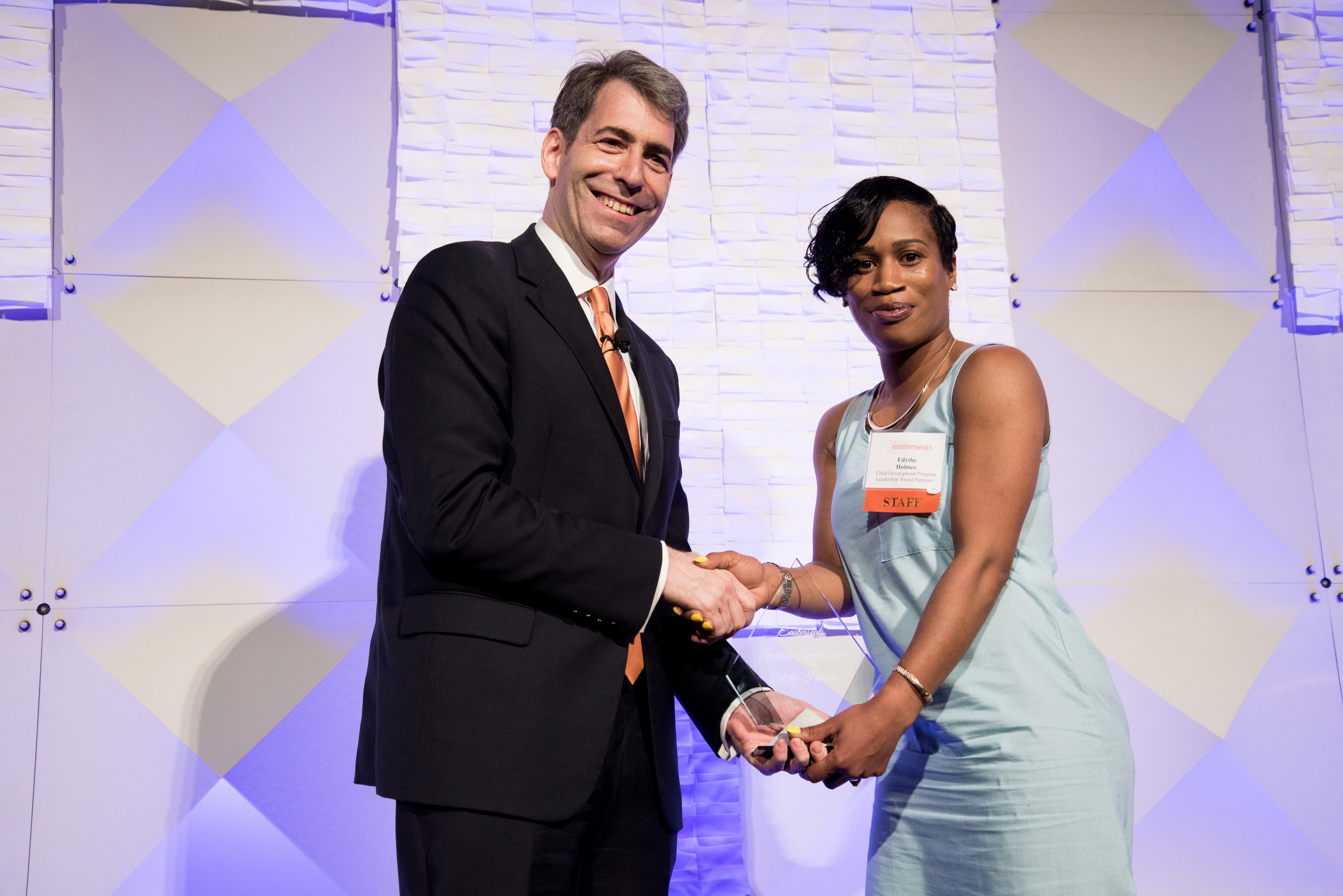
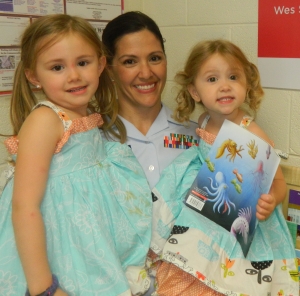 For example, the
For example, the 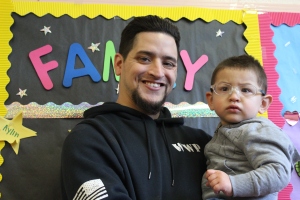 Eventually, Mike and his family decided to seek help and chose Easterseals to be a partner in care for their son. At the time Mike wasn’t even aware of Easterseals military programs. He chose Easterseals because of referrals from Mikey’s support team. As we got to know the Inzeos, we learned that Mike was considering a move overseas to earn more but didn’t want to be separated from Mikey. We connected him with the
Eventually, Mike and his family decided to seek help and chose Easterseals to be a partner in care for their son. At the time Mike wasn’t even aware of Easterseals military programs. He chose Easterseals because of referrals from Mikey’s support team. As we got to know the Inzeos, we learned that Mike was considering a move overseas to earn more but didn’t want to be separated from Mikey. We connected him with the